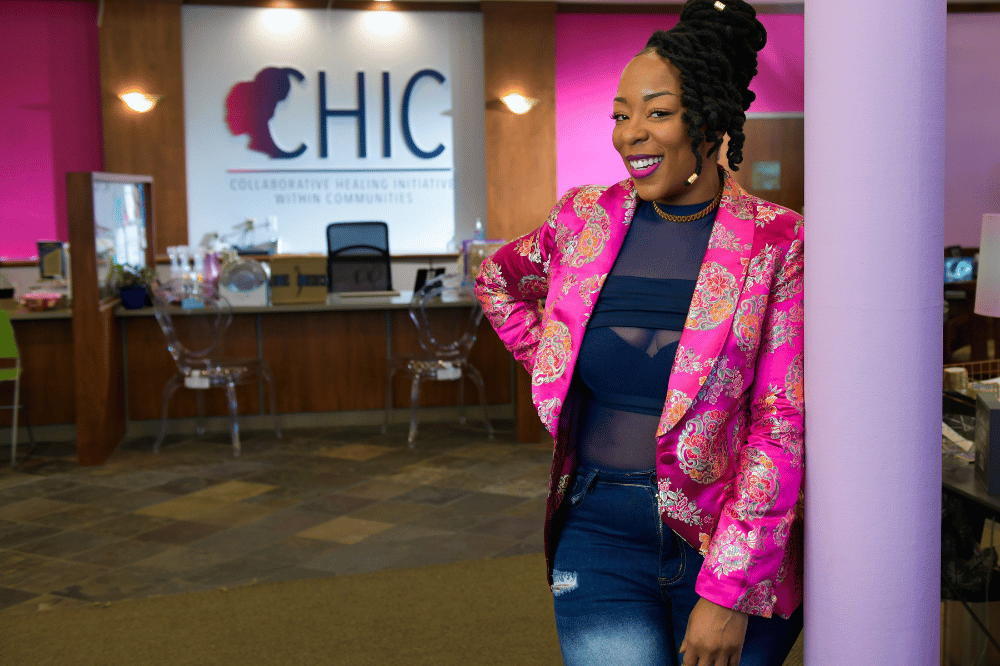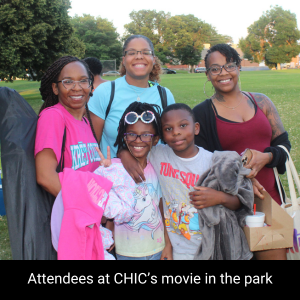
WFCO Grantee Seeks Justice for Black Coloradans
Sadé Cooper is igniting racial repair in Colorado and making history in the process
It’s no coincidence that during Women’s History Month Sadé Cooper testified in front of the Colorado Senate in support of Senate Bill 24-053, the state’s first racial equity study bill. The Senate approved the measure 23-12 that day and Sadé, representing the coalition Justice for Black Coloradans, felt so powerful that she “cried like a baby.” The bill is now waiting to be signed into law by Gov. Polis.
Neither Sadé nor her amazing team envisioned making history. In 2016, she and friend Hilari Smith were trying to launch Collaborative Healing Initiative Within Communities (CHIC) – a nonprofit to build economic, social, and cultural capital for Black women. Her calls and emails to secure initial funding mostly went unanswered. When she did meet with funders, they wouldn’t invest in organizations with budgets under $250,000.
However, one did eventually. CHIC received its first significant grant from The Women’s Foundation of Colorado for $20,000.
“I can tell you where I was when I got the call – in my car on 56th and Tower,” said Sadé. “I almost lost it. I felt like it took so long to get to that point. It changed the trajectory of CHIC.
From $0 and a Dream to $3 Million, 4 Programs, and a Staff of 15
As co-founder and CEO of CHIC, she reflects on that moment gratefully and humbly. She hopes it gives other women courage to never give up because she hears “yes” from funders far more often today. Although fundraising never stops, CHIC counts The Colorado Health Foundation, Margulf Foundation, Wend Ventures, Beacon Foundation, Black Resilience in Colorado (BRIC), the City and County of Denver, and more, as funders. The Women’s Foundation continues to invest in CHIC through our grantmaking programs, WINcome and the Women & Girls of Color Fund.
 Along with Hilari, CHIC’s co-founder and chief operating officer, Sadé oversees an annual budget of nearly $3 million, four programs serving women and youth, an emerging public policy practice, and a staff of 15. CHIC programs include:
Along with Hilari, CHIC’s co-founder and chief operating officer, Sadé oversees an annual budget of nearly $3 million, four programs serving women and youth, an emerging public policy practice, and a staff of 15. CHIC programs include:
- Workforce: Women at Work offers personal development career enrichment for women entering the construction trades or starting their own businesses.
- Re-entry (R3): Enter to Thrive provides intensive individual, group, and family mentorship and case management for women and girls impacted by violence and/or the criminal justice system.
- Education: Impact Youth partners with schools and school systems to facilitate student social, emotional, and cultural enrichment.
- Community: Hosting resources, events, and activities that get overlooked in Black communities.
“CHIC is the place I didn’t have as a kid, but I need in my community as a woman”
To accommodate CHIC’s growing team and impact, CHIC will start a capital campaign to purchase and develop commercial property. It will house CHIC’s programs, provide incubation space for Black women entrepreneurs, and build wealth for CHIC’s future serving the community.
“CHIC will be the place I didn’t have as a kid, but the place I need in my community as a woman,” said Sadé “It’s a community hub helping our community members get the resources they need. There is still a major disconnect in what resources are out there.”
Sadé has felt that disconnect in resources. She describes her childhood as tumultuous, experiencing homelessness and food insecurity while her mom tried to overcome a substance addiction and her father was incarcerated. The turbulence worsened when she had a baby at 17 and considered dropping out of school.
During that time, she visited a workforce center to weigh her options and met a woman who became a mentor. She told Sadé that she believed she could graduate on time. It’s what Sadé needed to hear. After having her baby, she returned to school, graduating on time and with honors. Sadé credits her mentor for encouraging her to not settle for a GED – a decision that enabled her to enter the world of finance and support her family for the next 12 years. At a local bank branch, she rose from teller to vice president/branch manager. But it came with a price tag.
We can’t support a child without supporting a mother’s economic empowerment
Despite being named the bank’s American Heart ambassador, spotlighted by headquarters, and chosen for an emerging leaders program, the “blatant racism” she experienced there took an irreversible toll on her health. Continually subjected to more scrutiny than her white peers, she suffered a miscarriage at 20 weeks. When she received a mandate to return to work immediately after the miscarriage, her OBGYN asked her, “How much more are you willing to take?”
Fatefully, a former colleague offered her a job the day she decided no more. She entered the nonprofit world as the workforce director for Impact Empowerment Group (IEG), which creates economic opportunity for men in gangs. While working at IEG, she had an epiphany that to change a community, it starts with women.
“We can’t support a child without supporting a mother’s economic empowerment,” she said.
IEG served as a fiscal sponsor for CHIC while Sadé and Hilari sought funding to make that vision happen. With grants from WFCO and others, CHIC started an education program and quickly added a workforce program. Women at Work focuses on putting women in construction careers because of their potential salaries.
 “I am truly proud to be able to provide livable wage training opportunities,” said Sadé. “CHIC will spend $128,000 this year alone to help women who want to train and engage in our programs.”
“I am truly proud to be able to provide livable wage training opportunities,” said Sadé. “CHIC will spend $128,000 this year alone to help women who want to train and engage in our programs.”
Social, emotional, cultural support… and cash assistance
All of CHIC’s programs carry social, emotional, and cultural components. In addition to career planning, readiness, and placement supports, Women at Work provides mental health services. Black women are less likely to seek mental health services because of prior experiences with the health care system, but CHIC knows wellbeing is a centerpiece of economic advancement.
Additionally, CHIC offers flexible cash assistance through Women at Work with help from The Women’s Foundation’s WINcome grantmaking program. Participating women receive stipends and CHIC also helps to remove financial barriers to their success. For instance, Tanjala, an aspiring welder who completed Women at Work in 2023, was unable to make her car payment and at risk of not finishing the program. “CHIC came through right on time,” she said. “They also paid for me to get a background check and fingerprints so I can substitute teach at Aurora Public Schools.” Tanjala now picks up shifts as a teacher for additional income.
Taking a huge step to close Colorado’s racial wealth gap with Justice for Black Coloradans
Although CHIC creates tangible economic opportunity through its programs, Sadé realized systemic change is necessary to close the racial wealth gap. Four years ago, as Black Coloradans experienced more severe health and economic consequences of the pandemic, Sadé’s thoughts kept turning to the need for meaningful systemic changes for Black Coloradans. The pandemic and the murder of George Floyd prompted her and Katherine Casey, CHIC chief strategy officer, to create a coalition that would lay the groundwork for racial repair in Colorado. Today, this coalition – Justice for Black Coloradans – developed and passed SB 24-053, to study historical and ongoing roots of systemic racism and identify measures to address those roots. One such idea is free postsecondary education for Black Coloradans.
“We have to repair some of the things we can’t control,” said Sadé. “If schooling is free, those dollars are going to go directly back into community. You can then reinvest them and cultivate businesses. If you think about the economic impact of what this bill does – every Coloradan will benefit.”
Her interest in public policy grew from CHIC’s participation in The Women’s Foundation’s WAGES grantmaking cohort from 2017-2021, which brought direct-service and public policy organizations together to inform and strengthen each other’s work. Through WAGES, she connected with the Bell Policy Center. The relationship has been critical to Sadé’s journey. The Bell Policy Center conducted the feasibility study on what it would cost to send Black Coloradans to school for free – and it informed the coalition on the legal groundwork to be done to introduce the bill. She now sits on the Bell Policy Center’s board of directors.
A deep understanding of community sets women of color leaders apart
Along with developing its public policy footprint, CHIC launched an entrepreneurship pathway program last year that coached 13 Black women starting businesses. Sadé is proud of CHIC’s response to community needs.
 “We do things that our community wants to do, like a movie in the park is because we don’t have those activities in North Park Hill. We shouldn’t have to go out of our community to access these things.”
“We do things that our community wants to do, like a movie in the park is because we don’t have those activities in North Park Hill. We shouldn’t have to go out of our community to access these things.”
A deep understanding of community is one reason why CHIC received a grant from WFCO’s Women & Girls of Color Fund in 2023 and 2024. The fund seeks to flip philanthropy’s underinvestment in women and girls of color, in which only .5% of all U.S. foundation funding benefits them.
“Sadé and women of color leaders simply know what their communities need to thrive in ways that others can’t,” said Camisha Lashbrook, WFCO director of donor relations and strategic grantmaking. “As CHIC’s first institutional funder, The Women’s Foundation of Colorado encourages other philanthropic institutions to rethink risk. Imagine what our communities might look like in seven or eight years if more women like Sadé received funding.”
“Imagine what our communities might look like in seven or eight years if more women like Sadé received funding,” Camisha Lashbrook, WFCO director of donor relations and strategic grantmaking
The Women & Girls of Color Fund acknowledges women of color’s historical leadership in every social justice movement, from #metoo to voting rights to reproductive justice. “Sadé is every reason we started this fund. We put resources behind the women who are changing history for their communities,” said Camisha.
A monumental moment for CHIC and the state of Colorado
Although the Racial Equity Bill is awaiting the governor’s signature, it still has hurdles to clear. Justice for Black Coloradans must raise $1.8 million through grants and individual contributions for researchers, a commission to oversee the research, and an economic analysis. The first $785,000 is due on July 1. With federal COVID funding running out, the bill likely would not have passed if a fiscal note was attached. But, Sadé is optimistic that the money can be raised.
“It will be a monumental moment for me and for the state of Colorado,” she said. “None of this happens without my faith in my Lord and Savior. My wealth is my faith.”
Support Justice for Black Coloradans
Visit the website to donate or checks can also be made out to CHIC (for operating expenses) or Justice for Black Coloradans (for the bill) and sent to CHIC at 10660 E. Colfax Ave, Unit A, Aurora CO, 80010.

